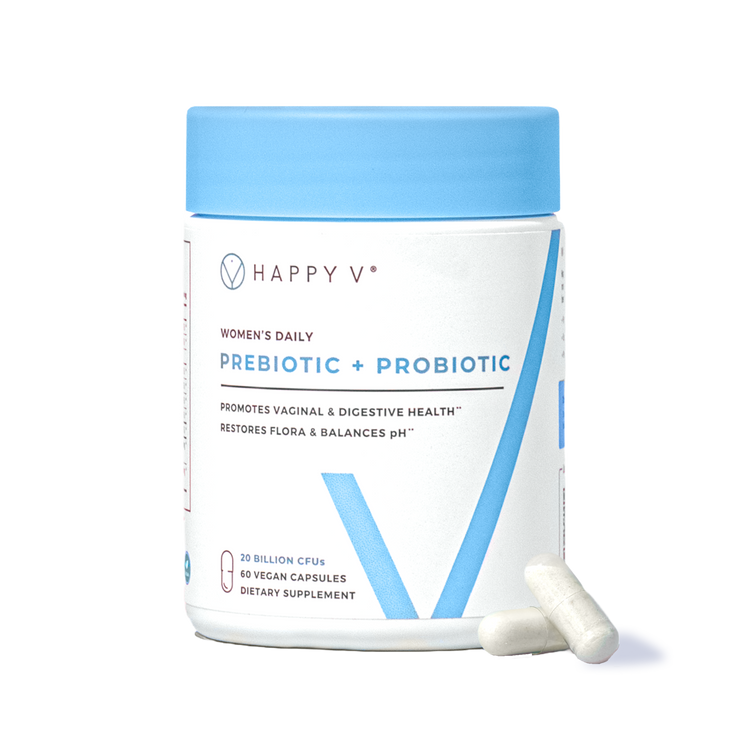- Fact Checked
- May 10, 2024
- 12 min read
Table of Contents
Catching a whiff of your own self through your pants is uncomfortable at best and downright mortifying at worst, especially if you are out with other people. Can they smell it, too? Do you think you are dirty?
We’re here to stop the spiraling and give you everything you need to know about vaginal odors. And the good news is all vaginas smell a certain way, and everyone smells a little bit different. That’s because everyone’s vaginal flora is a little different, and it’s the combination of the microbes within your flora and the sweat glands within the groin region that produce a mild odor.
But what about very strong odors or unpleasant odors that are accompanied by vaginal itching, dryness, or unusual vaginal discharge? These are a sign that something more could be at play. As for what that “something more” is, keep reading.

Is it normal for my vagina to smell?
In most cases, yes! Vaginal discharge itself is important. It helps prevent dryness, rid the vagina of dead cells, and protect against diseases1.
You may have noticed your vaginal and vaginal discharge tends tend to have a mild vaginal odor after a long day of work traveling. This is normal and is linked to some of the most common causes of mild vaginal odors, which include:
- Tight clothes or unbreathable undergarments
- Excessive sweating
- Overgrowth of otherwise normal vaginal bacteria
- Urinary incontinence, aka urine leakage
- Poor hygiene
- Unprotected sexual activity
As for what causes not-so-mild odors, we’ll dive into that next.

Why does my vagina smell different all of a sudden?

As we said, vaginas can smell like a number of different things and still be healthy and happy. But if you notice a new, unusual smell or a strong odor coming from your vagina, that’s definitely something to investigate.
Let’s talk about some of the most common causes of unusual odors.
1. Soury or tangy or fermented
A sour or tangy vaginal odor is generally an indication that your vaginal pH balance is off.
Essentially, your vaginal pH is determined by a healthy bacteria and probiotic called Lactobacillus. The lactobacillus produces hydrogen peroxide, which gives your vagina its slightly acidic pH of between 3.8 and 4.52. This slightly acidic pH helps keep the growth of bad bacteria in check and prevents them from adhering to the walls of your vagina, which is key in preventing infections and maintaining good vaginal health.
If your vaginal pH levels are more acidic than they should be, though, you will often notice a sour-y or tangy kind of smell.
2. Musky or skunky
You may sometimes notice a musky, skunky, or even earthy smell coming from your vagina that kind of smells like a stronger version of your normal body odor. This is because it kind of is. Musky smells are often caused by overperforming sweat glands in your groin region. This sweat mixes with the bacteria in and around your vagina, producing a strong, skunky odor that can sometimes be smelled through your pants.
3. Penny-like
If you ever notice a vaginal odor that is kind of metallic or penny-like, that is often due to blood that’s trapped in your vaginal canal. Typically, you will notice a smell like this during menstruation or if you are experiencing light spotting after sex. That’s because blood contains iron, which is a metal and therefore produces a metallic smell.
You also can experience vaginal odor like this after unprotected sex. Unprotected sex exposes your vagina to semen which is alkaline in nature, with a pH level between 7.1-8.0. This pH level is much higher than the pH level in your vagina and can cause vaginal pH imbalances.
4. Bleachy or ammonia-like scent
A bleachy smell coming from your vagina is often the result of severe dehydration or the presence of urine. If you suspect it could be dehydration, drink plenty of water throughout the day. If you suspect it could be urine, try:
- Using the bathroom when you feel the urge to go and not holding it in
- Rinsing your genital area thoroughly after urinating
- Seeking help from a healthcare professional if you believe you are experiencing urinary incontinence or leakage
5. Sweet or yeasty
A sweet-smelling or molasses-y vaginal odor can indicate an imbalance in your vaginal pH. You’ll want to look into ways to restore your vaginal pH ASAP since an imbalanced pH can lead to infection. We’ll talk about how to do that in just a bit.
However, if you notice a slightly sweet, yeasty smell accompanied by vaginal itching or thick white discharge, you may have already developed a vaginal yeast infection, in which case, make an appointment with your gynecologist to get started with treatment.
6. Rotten
If you ever notice a strong, rotten, or straight-up putrid smell coming from your vagina, that’s typically caused by something like a forgotten tampon, which is way more common than you might think.
The Food & Drug Administration (FDA) recommends you change your tampon every 4 to 8 hours, but changing more frequently, like every 2-4 hours, can be helpful for those who struggle with vaginal pH imbalance or BV.

Why does my vagina smell like dead fish?
If you are experiencing a strong, fishy odor from your vaginal, chances are you are experiencing bacterial vaginosis or BV.
Bacterial vaginosis is incredibly common. In fact, it’s one of the most common vaginal infections. According to the Centers for Disease Control and Prevention (CDC), BV affects about 21 million people every year in the US alone. Despite being so common, over 80% (!) of people don’t even know they have it because they don’t experience any symptoms.
For those that do experience symptoms, though, those symptoms of BV include:
· An unusual fishy smell
· Increased foul-smelling discharge
· Thin white or grey discharge3
· Burning sensation while urinating
· Itching around your vulva region
Even if you don’t experience symptoms, it’s critical to treat BV to maintain overall vaginal health and prevent the infection from spreading. That’s why it’s so important to keep annual appointments to screen for BV and other infections you might not know you have.
Wait… if I have bacterial vaginosis, does that mean I have an STI?
No. Even though there is a link between sex and the prevalence of BV and sex can exacerbate the symptoms of BV, bacterial vaginosis is not a sexually transmitted infection.
BV occurs for one of two reasons:
- Something affected the beneficial Lactobacillus, Acidophilus, and Bifidobacteria living in your microflora. Without these healthy bacteria, your vaginal pH becomes imbalanced, and you are more prone to infections. As for what that initial “something” is, there are a lot of potential factors, including:
- Your diet
- Wearing tight and unbreathable clothes
- Overuse and misuse of antibiotics
- Multiple or new sex partners
- Use of chemical-laden and fragrant products on your vagina4
- Douching
- Hormonal changes
- Unprotected sex
- Menstrual cycles
2) Bad bacteria, like Gardnerella vaginalis, Prevotella, Peptostreptococcus, or Mycoplasma, entered your vagina and began to overtake the healthy bacteria.
Can I restore my vaginal pH balance and bring it back to normal?

Fortunately, yes! Making lifestyle changes, like switching to lightweight cotton underwear, stopping douching, practicing good hygiene, and using protection like condoms, can all help restore your vaginal pH balance4.
Many people also find it most effective to pair these lifestyle changes with a daily probiotic supplement. Daily probiotics, particularly ones containing Lactobacillus, will begin repopulating your vaginal microflora with the healthy bacteria it needs to thrive.
At Happy V, our doctor-formulated Prebiotic + Probiotic helps do exactly this. Made with proven probiotic strains, our daily probiotic is designed to help eliminate the bad bacteria while repopulating the good. It’s been a game changer for thousands struggling with their vaginal health, finally breaking them from the cycle of perpetual vaginal infections like BV and yeast infections.

Prebiotic + Probiotic
Maintains vaginal pH and restores gut health.
My doctor ruled out BV… but my vagina still smells like dead fish. Why?

While BV is the most common cause of a fishy vaginal odor, it’s not the only one. Trichomoniasis is a common — but curable! — STI that can be hard to distinguish from BV at first, though typically the odor is slightly more pungent with trich than BV.
Trichomoniasis is caused by a parasite called Trichomonas vaginalis, which typically enters the body through genital sexual contact, including oral, vaginal, or anal sex.
And we know you don’t exactly want to think about “parasite” and “vagina” in the same sentence, but trichomoniasis is treatable, and you can prevent future occurrences with the proper protection.
What happens if I don’t treat BV or trichomoniasis?

Leaving a vaginal infection untreated is always bad for your vaginal health. But with BV and trich in particular, leaving them untreated can lead to serious health complications such as:
- Increased risk of preterm births
- Higher chances of contracting STIs and urinary tract infections (UTIs)
- Increased risk of acquiring infections post any kind of surgery in your genital area
- Pelvic inflammatory disease (PID)
- Recurrence of vaginal infections5
We know there can be some shame or embarrassment about infections and STIs, but we swear your gynecologist has seen it all, and they will help get you on the path to wellness.
If my vaginal odor is not caused by an infection, should I use a vaginal cleanser, vaginal wash, or douche to clear things up?

No, please don’t. Though these things smell great and seem like an easy way to rid yourself of strong odors, they can do more harm than good.
That’s because these cleansers, washes, wipes, and douches often contain chemicals that can disrupt your vaginal pH level, irritate your vagina mucosa, and cause dryness. And though the fragrances are pleasant on your nose, they are rough on your skin and can cause irritation, burning, or itching in or around your vagina.
And research actually supports this, showing that using douches and other intimate washes can increase your chances of vaginal infection.
1. Research conducted in 2016 studied the association between douching and HPV infections in 1271 participants between the ages of 20 and 49. Their findings suggested that douching in the past 6 months was significantly associated with an increased risk of all types of Human Papillomavirus (HPV) infections.6
2. Another study on 295 adolescent women showed that STIs within 3 months were associated with the use of feminine sprays and feminine wipes.7
So… how do I stop smelling myself through my pants?!

Even if douches and intimate washes are a no-go, there are lots of things that you can do to eradicate and prevent vaginal odors. Here are some of them:
- Gently but thoroughly cleanse your vulva with warm water and mild yet unscented soaps.
- Wash your vulva thoroughly before and after sex and after urinating.
- Switch to cotton underwear to avoid trapping sweat and bacteria in and around your genital area.
- Drink plenty of water to avoid dehydration4.
- Use protection during sex to prevent opportunistic bacteria from entering your vagina and disturbing your vaginal pH.
- Change your sanitary pads and tampons every 2-4 hours.
- Avoid sitting in damp or wet clothes after swimming. Damp, dark environments are the perfect breeding grounds for bad bacteria and unpleasant smells.
- Watch your sugar intake. Eating sugary foods or drinking sweetened beverages can lead to vaginal infections.
Are there any over-the-counter (OTC) remedies to clear vaginal odors?

Yes, taking a daily probiotic supplement can help clear up any existing odors and prevent future ones. Even better, find a probiotic that also has a prebiotic included. Prebiotics are dietary fibers that essentially act as food for the probiotics, making it more likely that they will populate and thrive in your vaginal flora.
Along with a prebiotic + probiotic, when it comes to a supplement, look for these 2 things:
2. Total colony forming units (CFU) of the clinically proven strains used. This indicates the number of live bacteria capable of multiplying and ‘forming a colony.’ Ideally, your supplement should have at least 1 million CFU per dose for each strain.
3. Effectiveness of the brands/strains used. Not all strains are created equal, especially when it comes to that lactobacillus bacteria that is essential to women’s health. Look for strains that have been specifically tested for their effectiveness.
And if you want a quality supplement that meets these criteria and is delivered straight to your door, check out Happy V’s doctor-formulated Prebiotic + Probiotic. It contains 8 clinically proven ingredients that are tested for their effectiveness and can help:
- Alleviate BV symptoms
- Alleviate the symptoms of vaginal yeast infection
- Restore normal and healthy vaginal flora
- Restore vaginal pH
When should I see a doctor?
Usually, mild odors aren’t anything to worry about health-wise. But if you want to minimize typical vaginal odor as much as possible, practice good hygiene, make healthy lifestyle choices, and add daily probiotics to your diet.
On the other hand, if the odors are strong and/or accompanied by vaginal itching and discharge, you should seek the advice of a healthcare provider. These symptoms often indicate a vaginal infection like BV or vaginal yeast infection. Your doctor will help make an accurate diagnosis and get you on a treatment plan.













